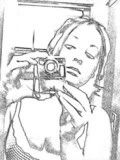Cloud_ax wrote:*brain explodes*
Daniel, ma belle
Moderators: Moderators, Ambassadors
- Cloud_ax
- Hymn of One
- Posts: 26123
- Joined: Mon Jan 08, 2007 7:20 pm
- Location: stealing a plane to Zi's wedding, who wants to come??
PolkadotConfederation wrote:colbertnationgirl wrote:Sorry, I'm in a random mood.kassiaL wrote:
kassiaL wrote:It's okay.colbertnationgirl wrote:Sorry, I'm in a random mood.kassiaL wrote:
*brain explodes again*

I'm Ziola's Little Brother.
My big sister is getting married!!
"If this is a dream, don't wake me up."
- colbertnationgirl
- Hymn of One
- Posts: 14857
- Joined: Sat Oct 21, 2006 10:42 am
Obsessive-compulsive disorder is often confused with the separate condition obsessive compulsive personality disorder. The two are not the same condition, however. OCD is ego dystonic, meaning that the disorder is incompatible with the sufferer's self-concept. Because disorders that are ego dystonic go against an individual's perception of his/herself, they tend to cause much distress. OCPD, on the other hand, is ego syntonic—marked by the individual's acceptance that the characteristics displayed as a result of this disorder are compatible with his/her self-image. Ego syntonic disorders understandably cause no distress. Persons suffering from OCD are often aware that their behavior is not rational and are unhappy about their obsessions but nevertheless feel compelled by them. Persons with OCPD, by contrast, are not aware of anything abnormal about themselves; they will readily explain why their actions are rational, and it is usually impossible to convince them otherwise. Persons with OCD are ridden with anxiety; persons who suffer from OCPD, by contrast, tend to derive pleasure from their obsessions or compulsions.[13] This is a significant difference between these disorders.
That was the weirdest display of geekdom that I have ever seen in my entire life.
- PolkadotConfederation
- Hymn of One
- Posts: 9802
- Joined: Tue Mar 20, 2007 9:54 pm
- Location: Wishing Fred Weasley was still alive.
- Contact:
- Cloud_ax
- Hymn of One
- Posts: 26123
- Joined: Mon Jan 08, 2007 7:20 pm
- Location: stealing a plane to Zi's wedding, who wants to come??
PolkadotConfederation wrote:Cloud_ax wrote:
*brain explodes again*
AHHHHHHHHHHHHHHHHHHHHHHH!!!!!!!!!!!!!!!!!!kassiaL wrote:Cloud_ax wrote:
*brain explodes again*
I'm Ziola's Little Brother.
My big sister is getting married!!
"If this is a dream, don't wake me up."
- colbertnationgirl
- Hymn of One
- Posts: 14857
- Joined: Sat Oct 21, 2006 10:42 am
Obsessive compulsive personality disorder (OCPD), or anankastic personality disorder, is a personality disorder that is characterized by a general psychological inflexibility, rigid conformity to rules and procedures, perfectionism, moral code, and/or excessive orderliness.
Obsessive compulsive personality disorder (OCPD) is often confused with obsessive-compulsive disorder (OCD). This could be due to the more commonly known OCD and the similarities in name of the two disorders, however the mindsets are typically very different and unrelated.
Those who are suffering from OCPD do not generally feel the need to repeatedly perform ritualistic actions, a common symptom of OCD. Instead, people with OCPD tend to stress perfectionism above all else, and feel anxious when they perceive that things are not "right".
People with OCPD may hoard money for future use, keep their home perfectly organized, or be anxious about delegating tasks for fear that they won't be completed correctly. There are four primary areas that cause anxiety for OCPD personalities: time, relationship, uncleanliness, and money. There are few moral gray areas for a person with fully-developed OCPD; actions and beliefs are either completely right, or absolutely wrong. As might be expected, interpersonal relationships are difficult because of the excessive demands placed on friends, romantic partners, and children.
That was the weirdest display of geekdom that I have ever seen in my entire life.
- BallsyMcD
- P. Monkey's Agent
- Posts: 2484
- Joined: Sat Nov 25, 2006 3:12 pm
- Location: Minneapolis, MN
- Contact:
why are you reading about this?colbertnationgirl wrote:Obsessive compulsive personality disorder (OCPD), or anankastic personality disorder, is a personality disorder that is characterized by a general psychological inflexibility, rigid conformity to rules and procedures, perfectionism, moral code, and/or excessive orderliness.
Obsessive compulsive personality disorder (OCPD) is often confused with obsessive-compulsive disorder (OCD). This could be due to the more commonly known OCD and the similarities in name of the two disorders, however the mindsets are typically very different and unrelated.
Those who are suffering from OCPD do not generally feel the need to repeatedly perform ritualistic actions, a common symptom of OCD. Instead, people with OCPD tend to stress perfectionism above all else, and feel anxious when they perceive that things are not "right".
People with OCPD may hoard money for future use, keep their home perfectly organized, or be anxious about delegating tasks for fear that they won't be completed correctly. There are four primary areas that cause anxiety for OCPD personalities: time, relationship, uncleanliness, and money. There are few moral gray areas for a person with fully-developed OCPD; actions and beliefs are either completely right, or absolutely wrong. As might be expected, interpersonal relationships are difficult because of the excessive demands placed on friends, romantic partners, and children.
The adjectives add an element of psychological warfare amongst the children, because they can insult the circle, confuse the circle with 'May Duck' or 'Gray Puck'
- colbertnationgirl
- Hymn of One
- Posts: 14857
- Joined: Sat Oct 21, 2006 10:42 am
The DSM-IV-TR, a widely-used manual for diagnosing mental disorders, defines that for a patient to be diagnosed with obsessive-compulsive personality disorder, they must exhibit at least four of the following traits:
Preoccupation with details, rules, lists, order, organization, bodily functions, or schedules to the extent that the major point of the activity is lost
Showing perfectionism that interferes with task completion (e.g., is unable to complete a project because his or her own overly strict standards are not met)
Excessive devotion to work and productivity to the exclusion of leisure activities and friendships (not accounted for by obvious economic necessity)
Being overconscientious, scrupulous, and inflexible about matters of morality, ethics, or values (not accounted for by cultural or religious identification)
Inability to discard worn-out or worthless objects even when they have no sentimental value
Reluctance to delegate tasks or to work with others unless they submit to exactly his or her way of doing things
Adopting a miserly spending style toward both self and others; money is viewed as something to be hoarded for future catastrophes
Showing rigidity and stubbornness
Urge to perfect every little thing
That was the weirdest display of geekdom that I have ever seen in my entire life.
- colbertnationgirl
- Hymn of One
- Posts: 14857
- Joined: Sat Oct 21, 2006 10:42 am
colbertnationgirl wrote:Obsessive compulsive personality disorder (OCPD), or anankastic personality disorder, is a personality disorder that is characterized by a general psychological inflexibility, rigid conformity to rules and procedures, perfectionism, moral code, and/or excessive orderliness.
Obsessive compulsive personality disorder (OCPD) is often confused with obsessive-compulsive disorder (OCD). This could be due to the more commonly known OCD and the similarities in name of the two disorders, however the mindsets are typically very different and unrelated.
Those who are suffering from OCPD do not generally feel the need to repeatedly perform ritualistic actions, a common symptom of OCD. Instead, people with OCPD tend to stress perfectionism above all else, and feel anxious when they perceive that things are not "right".
People with OCPD may hoard money for future use, keep their home perfectly organized, or be anxious about delegating tasks for fear that they won't be completed correctly. There are four primary areas that cause anxiety for OCPD personalities: time, relationship, uncleanliness, and money. There are few moral gray areas for a person with fully-developed OCPD; actions and beliefs are either completely right, or absolutely wrong. As might be expected, interpersonal relationships are difficult because of the excessive demands placed on friends, romantic partners, and children.
Hello, I'm Jo.
And yeah, I'm a guy. Jo's just a nickname.
kthxbai
And yeah, I'm a guy. Jo's just a nickname.
kthxbai
- kassiaL
- Lonely Fan
- Posts: 150
- Joined: Fri Feb 16, 2007 1:31 pm
- Location: Soon to be Honolulu, Hawai'i
How cool.The Antikythera mechanism (Greek: O μηχανισμός των Αντικυθήρων, O mēchanismós tōn Antikythērōn) is believed to be an ancient mechanical calculator (also described as a "mechanical computer") designed to calculate astronomical positions. It was discovered in the Antikythera wreck off the Greek island of Antikythera, between Kythera and Crete, and has been dated to about 150-100 BC. It is especially notable for being a technological artifact with no known predecessor or successor; other machines using technology of such complexity would not appear until the 18th century.
Hey! I'm Kassia. 
I really do waffle Chelsey.
I really do waffle Chelsey.
- colbertnationgirl
- Hymn of One
- Posts: 14857
- Joined: Sat Oct 21, 2006 10:42 am
Ooooooooooh.kassiaL wrote:How cool.The Antikythera mechanism (Greek: O μηχανισμός των Αντικυθήρων, O mēchanismós tōn Antikythērōn) is believed to be an ancient mechanical calculator (also described as a "mechanical computer") designed to calculate astronomical positions. It was discovered in the Antikythera wreck off the Greek island of Antikythera, between Kythera and Crete, and has been dated to about 150-100 BC. It is especially notable for being a technological artifact with no known predecessor or successor; other machines using technology of such complexity would not appear until the 18th century.
That was the weirdest display of geekdom that I have ever seen in my entire life.
ohhhhhhhh i remember thatkassiaL wrote:How cool.The Antikythera mechanism (Greek: O μηχανισμός των Αντικυθήρων, O mēchanismós tōn Antikythērōn) is believed to be an ancient mechanical calculator (also described as a "mechanical computer") designed to calculate astronomical positions. It was discovered in the Antikythera wreck off the Greek island of Antikythera, between Kythera and Crete, and has been dated to about 150-100 BC. It is especially notable for being a technological artifact with no known predecessor or successor; other machines using technology of such complexity would not appear until the 18th century.
Hello, I'm Jo.
And yeah, I'm a guy. Jo's just a nickname.
kthxbai
And yeah, I'm a guy. Jo's just a nickname.
kthxbai

